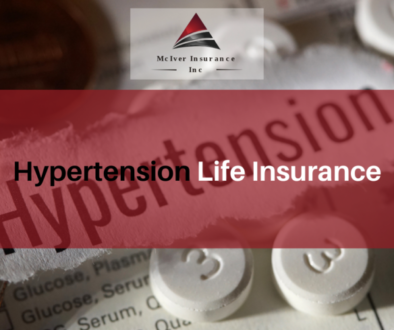Sleep Apnea & Life Insurance
Table of Contents
Key Takeaways
- Sleep apnea’s severity and management can significantly impact life insurance rates.
- Insurers classify sleep apnea as a pre-existing condition, hence influencing eligibility and premium costs.
- Options like guaranteed acceptance life insurance may be available for severe cases.
According to the NIH, in 2024, an estimated 5.4 million Canadians were diagnosed with sleep apnea, with this number expected to increase in the coming years.
But what is sleep apnea, and how can it impact your ability to get life insurance?
Let’s find out!
Sleep Apnea and Its Impact on Life Insurance
Sleep apnea is a common but often misunderstood condition.
Simply put, sleep apnea is a sleep-related breathing disorder where breathing repeatedly stops and restarts during sleep, resulting in sleep disruption, loud snoring, and poor ventilation.
There are also three main types of sleep apnea.
Obstructive Sleep Apnea (OSA)
The most common type of sleep apnea. OSA occurs due to airway blockages caused by soft tissues in the throat collapsing during sleep.
Central Sleep Apnea (CSA)
Caused by the brain failing to signal the throat muscles to breathe due to complications in the respiratory control center.
Complex Sleep Apnea Syndrome (CompSAS)
This much rarer form of sleep apnea is a combination of both OSA and CSA, making it much harder to treat.
If left untreated, these can lead to serious health problems like high blood pressure, heart disease, and diabetes.
If you’ve been diagnosed with sleep apnea, it’ll likely affect your life insurance premiums or even your ability to get coverage at all.
But don’t despair.
You can qualify for affordable options with the right management plan.
Here’s how.
Managing Sleep Apnea to Improve Insurance Options
Sleep apnea doesn’t have to be a dealbreaker. By learning to manage it well, you can open doors to much better insurance options.
Here are some common tips to follow that can make a big difference:
- Use a CPAP machine every night, or as prescribed
- Quit smoking and alcohol
- Lose weight, if needed
- Stay on top of other health issues like high blood pressure
Ensuring sleep apnea symptoms are manageable and in control can help lower the perceived risk of sleep apnea to a life insurance provider, resulting in lower premium rates and better coverage terms. It will also result in improved sleep and a better quality of life.
The Impact of Sleep Apnea Severity on Insurance Premiums
Insurers don’t look at sleep apnea as a one-size-fits-all condition. Risk is assessed based on whether your sleep apnea is mild, moderate, or severe.
Mild sleep apnea
Often qualify for standard or even preferred rates if symptoms are well-managed and there are no related complications.
Moderate sleep apnea
If your condition is moderate but manageable, premiums are higher but not overly expensive.
Severe sleep apnea
In more severe cases, where sleep apnea is left untreated or poorly managed, insurance providers may offer much higher premiums or even decline applications.
Insurance Underwriting Process for Sleep Apnea Patients
When you apply for life insurance, the insurer sends your case to the underwriting team. This is where they decide your risk level to determine premium rates.
For individuals living with sleep apnea, underwriters will require specific information, such as:
- The severity of your condition (based on your sleep study results)
- The type of sleep apnea you have been diagnosed with
- Whether you use a CPAP machine or other forms of treatment
- Any complications or related illnesses
- Frequency of doctor visits
- Family medical history
Some insurers will even treat a case more favourably if the applicant can prove consistent CPAP usage by sending in data from their machine’s data log.
Disclosure and Documentation of Sleep Apnea in Insurance Applications
Full disclosure about your sleep apnea is essential when applying for life insurance.
If you try to hide your condition and your insurer finds out later, your policy will most likely be cancelled, or your beneficiaries will be denied any death benefit.
When applying for life insurance with sleep apnea, you’ll most likely have to provide the following documents:
- A recent sleep study report (polysomnography)
- Doctor’s notes showing diagnosis and treatment plan
- Proof of CPAP compliance, if that’s part of your treatment
- Info on related health issues like high blood pressure or diabetes
- Family medical history (if needed)
Insurers require these documents to understand the full extent of your condition. The more evidence you can provide to support your condition management, the better your odds of getting competitive premiums and favourable terms.
Types of Life Insurance Available to Individuals with Sleep Apnea
Individuals with sleep apnea have access to the same type of life insurance policies as everyone else.
In Canada, the two most common types of life insurance policies include:
- Term life insurance – Offers coverage for a set period (e.g., 10, 20, or 30 years). It’s usually the most affordable option.
- Permanent life insurance – Covers you for life and builds cash value over time at the cost of higher premiums.
However, if you are living with severe sleep apnea and have been denied coverage for regular policies, you do have other options.
Some insurance providers offer Guaranteed Acceptance Life Insurance. This type of policy requires no medical exam, but offers lower coverage amounts and higher premium costs.
You could also be eligible for a Simplified Issue Life Insurance policy that requires a short health questionnaire to be filled out, but no medical exam. These policies offer higher coverage amounts, quicker approval, and more features, but are also more expensive than standard term policies.
Challenges and Considerations in Insuring Sleep Apnea Patients
The biggest challenge when it comes to insuring sleep apnea patients is assessing the severity of the condition.
If you can’t prove that your condition is being controlled or managed properly, most insurers will charge higher premiums or deny coverage altogether.
Luckily, modern technology has made sleep apnea management easier to track. Insurance providers are a lot more open to offering life insurance to sleep apnea patients who use CPAP machines and utilize wearable devices and apps to measure sleep quality and overall health.
Legal and Regulatory Aspects of Insuring Sleep Apnea
In Canada, you’re protected by privacy laws that keep your medical information confidential. Insurers can only request what’s necessary to assess your risk.
That said, if sleep apnea puts you at higher risk for other conditions, insurers have a legal right to factor that into your premiums. Provincial regulations (like those in Nova Scotia) ensure fair underwriting practices, but they don’t prevent higher premiums based on health status.
Luckily, many insurance companies are realizing that well-managed sleep apnea cases shouldn’t be penalized, and as such, getting life insurance while living with sleep apnea has become more plausible than ever before.
Buying Life Insurance as a Sleep Apnea Patient
Sleep apnea in Nova Scotia is more common than you think. While getting life insurance may seem tricky and out of reach, it’s far from impossible.
The key is proper management, full disclosure, and working with a trusted insurance broker who understands how to navigate the system.
At McIver Insurance Inc., we’ve helped plenty of Nova Scotian breadwinners living with sleep apnea and pre-existing medical conditions get the coverage their family needs at affordable premiums.
Call Pat at 1-902-220-3279 to get your family the financial protection they deserve!
FAQ Section
Q) What is sleep apnea, and why does it affect life insurance rates?
Sleep apnea is a medical condition where breathing stops during sleep, resulting in serious health problems. Insurers see this as a risk, especially if it isn’t well managed, resulting in higher premiums and even coverage denial.
Q) What types of life insurance are available to someone with sleep apnea?
All types of life insurance policies are available for those living with sleep apnea. However, guaranteed or simplified issue policies may be better for those with severe or untreated conditions.
Q) How do I manage my sleep apnea to qualify for better insurance rates?
Use your CPAP machine regularly, maintain a healthy lifestyle, keep on top of your doctor appointments, and keep all your medical documentation organized for better rates and coverage terms.



